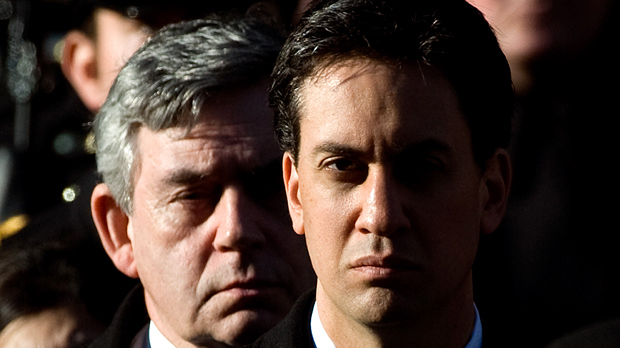Ed Miliband fights back: ‘bring it on’
Ed Miliband hits back at critics of his leadership, insisting that he relishes the fight to restore public confidence in Labour and has a “very clear plan” for the party.

In an interview with The Guardian, Mr Miliband described himself as “someone of real steel and grit” and pointed out that Labour had gained 10 points in the polls since the heavy 2010 general election defeat.
The party had “not yet won” the argument over the economy, he admitted, but he insisted that faith in the government’s strict austerity programme was crumbling faster than anticipated.
To win over the public, Labour must therefore establish how it would make society fairer in an era where the money used by previous administrations to further that aim was not available, he said.
FactCheck: Is Labour picking up women voters from the Tories?
“The Blair-Brown route is not available to us,” he said – such as the building of new schools and hospitals and the introduction of tax credits.
“The issue we are going to have to be talking about in the coming months is, what does this all mean for Labour in 2014-15? How are we going to make our society fairer in a world where there is less money around? That is the central challenge facing the next Labour government. It is the kernel of what I stand for.”
Battle over bankers
Winning back public faith in Labour’s ability to handle the economy would take time though, he conceded.
But Mr Miliband said the suggestion that elements of his top team did not accept the need for fiscal credibility and denied any sense of an economic policy was “ridiculous”.
“I don’t think David Cameron and George Osborne set out their fiscal rules until a few months before the election. I just don’t agree there is a vacuum,” he told the newspaper.
“It is an incredibly important task, not something that takes place in six months or a year. We – Ed (Balls) and I – get this more than anyone, that this is an important task for Labour.”
The Prime Minister has signalled that he will unveil further measures to curb bankers’ bonuses this weekend, saying the level of City remuneration was “completely out of whack”.
FactCheck: Do we really need to bash the bankers?
Mr Miliband challenged him to match Labour’s pledges on the issue.
“If one of the big battlegrounds of British politics is going to be who is really going to take action on executive pay, I say ‘bring it on’. I promise you they are not going to steal a march on us in this area.
“Does anyone really believe that David Cameron came into politics to create a more responsible capitalism? The public are not going to buy it.
“My test for him on executive pay is whether he would do what Labour would do if we were in office now: put an employee representative on every remuneration committee, make firms publish their pay ratios, empower pension companies and investors, and have another year of the bank bonus tax to get some of our young people back to work.
“There can’t be any more foot-dragging and backsliding. If David Cameron wants a more responsible capitalism – responsibility at the top and the bottom – then this would be a start.”
Labour has set out a series of demands to tackle excessive executive pay – including improving transparency by simplifying remuneration packages and publishing a league table of how much more bosses earn than employees.
It also wants to see an employee representative on the remuneration committee of every company and an obligation on investors and pension fund managers to disclose how they vote on remuneration packages.
Hitting back at critics
At the end of a tough week for the Opposition, Mr Miliband rubbished suggestions of splits within the shadow cabinet over the need to accept some spending cuts.
He also struck a combative note over executive pay ahead of announcements expected this weekend by David Cameron on the issue – saying voters would never believe the Prime Minister wanted a “more responsible capitalism”.
“These are the hard yards of opposition. We have taken the hard road, not the line of least resistance,” Mr Miliband said when confronted with criticisms of his 15-month tenure.
Labour peer Lord Glasman, the architect of the Blue Labour philosophy who has advised the leader in the past, complained earlier this week that the party appeared to have “no strategy, no narrative and little energy”.
Under Mr Miliband, the Opposition “show no signs of winning, the economic argument”, he added.
But Mr Miliband defended his record as “the guy who took on Murdoch” over phone hacking and called for a shake-up of capitalism to remove “predatory” firms.
“I always knew it was going to be a fight. It is one I relish – I never expected it to be anything else,” he said.
“What is the most important thing for a leader of the opposition to have? It is to establish an argument about what is wrong with the country and what needs to change.
“I have a very clear plan and I have set out very clear themes.”
The Conservatives seized on remarks by shadow defence secretary Jim Murphy that Labour needed to show “credibility” by explaining where it would make cuts as signs of dissent against the leadership.
However Mr Miliband said in fact Mr Murphy’s announcement that he would accept £5 billion-worth of the government’s military cuts was “exactly what (shadow chancellor) Ed Balls said he wanted shadow ministers to do.
“There are lots of cuts we are not going to be able to reverse. That is the way it is. To say otherwise would not be credible,” he said.